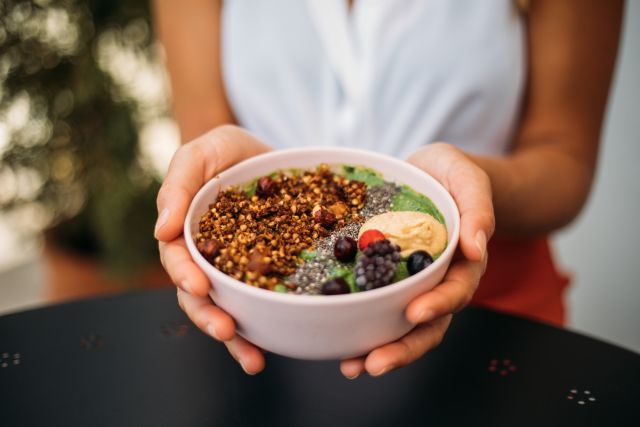Digestion is the process by which the gastrointestinal (GI) tract breaks down the foods and beverages you consume into smaller and smaller pieces. These pieces are eventually small enough that they can be used as nutrients that cells use for energy, growth, and repair (which is a separate process called metabolism).
Digestion also includes the process of eliminating waste—things your body does not need.
While digestion is a complex process that involves many steps, it begins with the simple act of food or drink entering your mouth. And the way that food and beverages enter your mouth can affect the rest of the digestive process.
Here, we look at a practice called mindful eating, and how it may benefit people who are living with IBD.
Digestion and IBD
Inflammatory bowel disease (IBD) refers to two conditions, ulcerative colitis (UC) and Crohn’s disease.
Both conditions cause recurring attacks of inflammation in the GI tract, though they are separate conditions with separate patterns of symptoms. UC causes inflammation in the colon (large intestine) and rectum, while Crohn’s disease can cause inflammation anywhere along the GI tract.
Either form of IBD can have an impact on how a person eats, what a person eats, their body’s ability to digest food, and their body’s ability to absorb nutrients from the foods and beverages they consume.
Malnutrition, micronutrient deficiencies, dehydration, and unintended weight loss are all common complications that can arise. Many people with IBD also experience disordered eating.
Treatment and nutrition
There is no known cure for either form of IBD, but there are therapies that can help manage and control the condition. Nutrition is also an important focus of treatment.
People with IBD may need to avoid certain foods that trigger or contribute to symptoms. For example, people are often advised to avoid certain foods during a flare (an attack of inflammation where symptoms have worsened). This includes foods that are more difficult for the body to digest, such as dairy, raw veggies, and fatty foods.
For another example, people with IBD might be advised to eat smaller meals—six smaller meals spread throughout the day, instead of three larger meals.
Steps like these can help make food easier to digest.
IBD and mindful eating
Mindful eating is one approach to practicing mindfulness—an effort to be fully present and fully aware of each moment. If you have ever tried meditation, think of the state of mind you aim to achieve while meditating.
Mindful eating takes this approach and applies it to the way you consume food and beverages—in other words, focusing on what you are eating and how you are eating. A few of the basic concepts include:
- Eliminate distractions while you eat. For example, turning off a TV or putting aside your phone.
- Eat at a slow and reasonable pace. Chew each bite completely and swallow each bite before finishing the next. This can make it easier for your body to digest the food.
- Appreciate the food you are eating, including the work that went into preparing the food, the nutrition you are getting from the food, and the flavor and texture of the food.
While there is no diet or method of eating that can cure IBD or fully control symptoms, good habits can help.
Another benefit of mindful eating may be lower stress. Stress and GI disorders like IBD can have a cyclical relationship—stress may exacerbate symptoms, and symptoms can exacerbate stress. If food and meals are a source of stress at times, a mindfulness practice might help.






